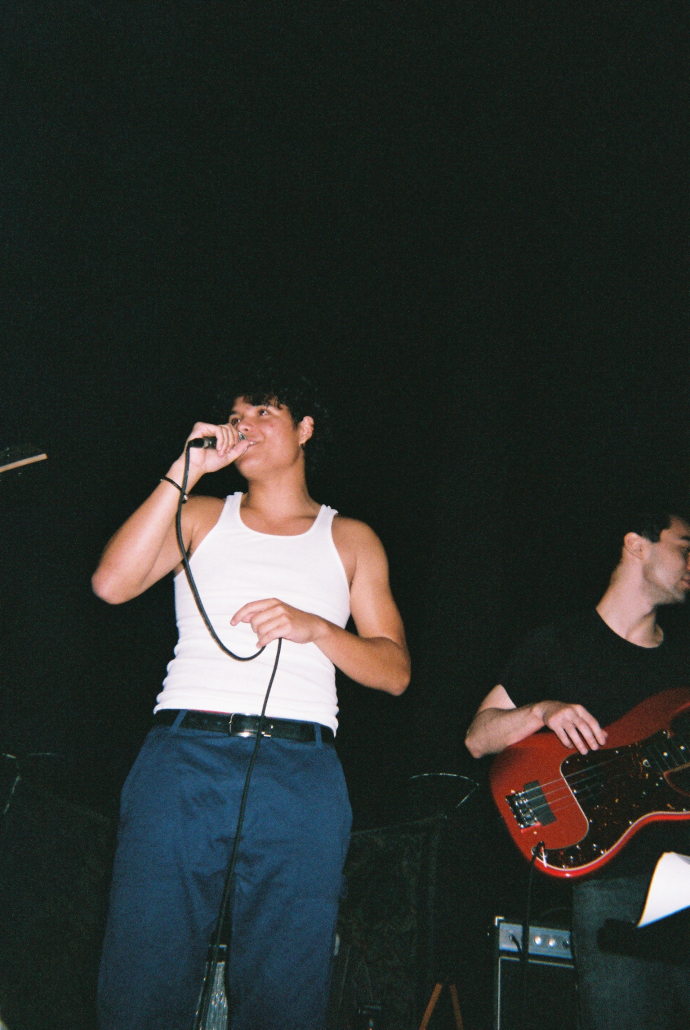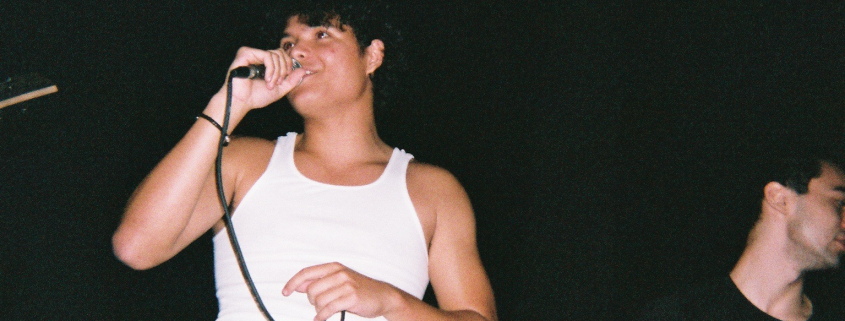Alex Oliva paves his own path to success

Picture this: You’re at summer camp, and, from half a mile away, out of nowhere, you hear “California Gurls” by Katy Perry. The source? A spontaneous ensemble of elementary school-aged children, led by a five-year-old Alex Oliva.
For Oliva, a senior majoring in performance (popular music), that song meant more than an earworm. Oliva believes that every song contains value, whether it’s a quick and catchy pop song playing on the radio or a soulful ballad.
“Sometimes, the actual content within [a song] isn’t meaningful, but, as a whole, songs can be meaningful,” Oliva said. “But, just because it was such a fun song, now, whenever I hear it, I just get so happy, and I want my music to mean that for people, and to remind them of a specific place or time.”
Oliva entered the music realm with piano lessons at four years old. In eighth grade, his curiosity was piqued by YouTube pop music singing tutorials, where he said he “re-fell” in love with music. Investing time into his favorite music genre expanded his horizons as an artist.
His musical influences stem from his parents’ vast range of favorites such as Stevie Wonder, Earth, Wind & Fire, Chicago, Whitney Houston and Bon Jovi. Oliva’s passions transition from classic rock and Motown to R&B elements from rappers such as J. Cole and Kendrick Lamar.
Working with others has given Oliva the opportunity to improve and gain more experience in forming a personal style — or “groove” — as well as leadership skills he’s developed from directing a band, he said.
“I’m constantly learning from my peers. I learned just as much from my peers [as] I [have] learned from my teachers, I’d say,” Oliva said. “I just feel really blessed to be able to learn from them constantly and be a student [of] their wisdom.”
Signed to 840 West, USC’s student-run record label, Oliva’s first single, titled “Baby Girl” released in September 2020 and his most recent single, “u & i,” featuring Jillian Batt, dropped March 2021. Each song received more than 6,000 streams on Spotify.
“Both of those [songs] were kind of like me dreaming of other times. Just normalcy when I didn’t have normalcy, I guess you could say,” Oliva said. “I love spending time with my family, but I was definitely missing a connection with friends. Even though those songs are romantic, there is still influence that I draw from how much I love my friends. So it was kind of approaching those [songs] certainly with a sense of desire, and wishing to be back to a place where I wasn’t.”
“Baby Girl” was Oliva’s attempt to lighten up the gloom of 2020. Performance and relatable music makes Oliva an unforgettable artist and personality to his colleagues and vocal instructor.
“What really stood out for me with Alex is, he’s all about performing. Like, he’s really into performing and making sure that he’s very audience-driven,” said Kristin Logemann, a sophomore majoring in music industry. “He wants to make sure that everyone is having a good time and is relating to his music.”
Jeffrey Allen, an assistant professor of practice at the Thornton School of Music, can attest to the charisma Oliva embodies as a hardworking student and singer who truly takes in opportunities and lessons whole-heartedly to consistently improve and define his voice.
“Alex has a kind of joie de vivre. I think he’s got a very intoxicating energy,” Allen said. “In the performance world, we have people who have a lot of ability, we have people that have a lot of technical training, but there’s always that X factor. And I think Alex just has some of that X factor.”
Oliva’s next single will be more vulnerable compared to the previous two and geared toward alternative R&B. He also plans for his next few releases to carry similar themes that contain a story but also string together a larger narrative.
“The genre is a little bit more aligned with what I want to do. And a lot of them are kind of about looking back at my struggles,” Oliva said. “A lot of those songs kind of look back to those moments, and some of it is when I got out of it, and some of it is when I was in the thick of it.”
Growing up in a predominantly white town in Philadelphia, Oliva said he didn’t see many Pilipino artists or musicians he could look up to as role models, but he’s found a way to consider this a benefit.
“I think [not having many Pilipino musician role models] was almost a blessing because I didn’t feel like I needed to listen to one type of music. So I got all these amazing influences from all different types of cultures and perspectives,” he said.
Developing his own artistry in the music scene with his individual style and beliefs, Oliva said he hopes to become a voice for Pilipino children with dreams similar to his own.
“Music and dancing and art in the Pilipino culture is so prevalent and so vibrant. And people are constantly singing; that’s one of the first places where I really played and sang pop songs for people,” Oliva said. “[I] started playing and singing for people and I saw what that can do, and how it can bring people together. So I really do want to make sure that there’s Pilipino children out there who can look and see like, ‘Hey, that’s a Pilipino person that’s killing it and has their own artistic vision for their life.’”

